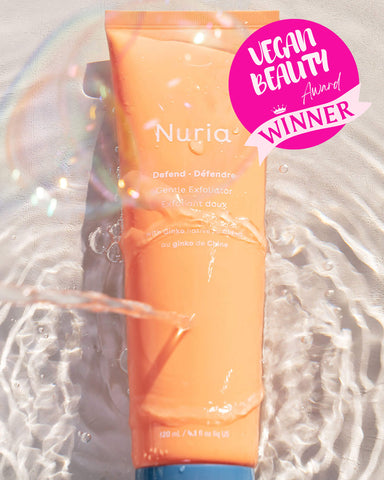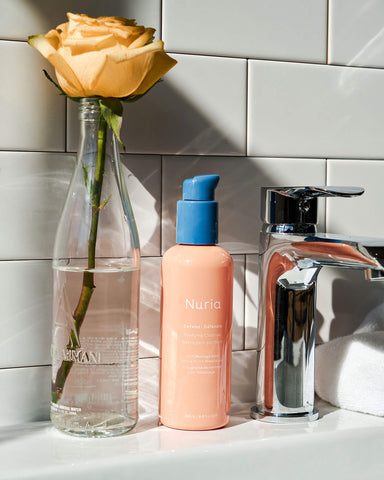
Exfoliation: What it is & How it Helps You Glow
What do you do when it’s a been a long week and you’re ready to scrub the day away? You exfoliate, right? Exfoliation can help your skin look better in a number of ways.
It can help your skin look brighter, smoother, and more able to absorb the other products in your skincare routine. Done regularly, exfoliating can also help prevent clogged pores, which leads to fewer breakouts.
Exfoliation can even help minimize the appearance of fine lines and stimulate cell renewal. Basically, it helps you look more radiant and glowing. And who doesn’t want to look radiant and glowing?
But when it comes to exfoliation, there can been too much of a good thing. Here’s the good, bad, and yes, the ugly truth about exfoliating your skin.
Why do we need to exfoliate?
Roughly every 30 days or so, our skin naturally sheds skin cells to make room for new. Age, lifestyle, and other factors can slow the process by which those layers turn over, and not all of the dead skin cells are shed. When those dead layers build up, it can make your skin feel rough, look uneven, and even lead to clogged pores.
Plus, the dead layers actually trap light and make your skin appear dull. Exfoliation is the process of removing some of those dead cells so that the younger, fresher skin layers can make their way to the surface.
Exfoliating those layers helps you not only get that soft, smooth skin you've been craving, but also brightens and lightens your skin for a radiant glow.
There are two types of exfoliation: Physical and Chemical
Physical exfoliation
Physical exfoliation relies on, well, physical abrasives to remove those outer layers. Examples of physical abrasives are microbeads, scrubs, loofahs, and cleansing pads. When using a physical exfoliator, take care to ensure you are not rubbing too hard.
While it’s tempting to scrub away wrinkles, over scrubbing can be harmful. The pressure you apply to your skin should not be any harder than the pressure you would apply to a tomato. Don’t treat your skin like you would a saucepan that has something stuck to the bottom.
Chemical exfoliation
The second type of exfoliator is chemical. Chemical exfoliators help peel away surface skin cells, allowing new ones to come to the surface to take their place. The most common chemical exfoliators are Alpha Hydroxy Acids (AHAs) Beta Hydroxy Acids (BHAs) and Retinoids (Derived from Vitamin A).
Examples of AHAs are Glycolic acid, Lactic acid, and Citric acids. AHAs can help address mild hyperpigmentation, uneven skin tone, and the appearance of fine lines. They can even break through the surface skin layer, allowing your moisturizer to hydrate your new skin cells more effectively.
While the word “acid” might sound scary, many acids are actually derived from nature. For example, the Defend Gentle Exfoliator uses Ginkgo and lactic acid from fruits and vegetables to slough away those unwanted dead skin cells. It was inspired by the women of China who use exfoliating ingredients that have a gentle power and keep the skin barrier healthy.
So how often should you exfoliate?
Because most of us enjoy the results we see from exfoliation, it’s tempting to want to add it to our daily skincare routine. The reality is that for most people, exfoliating once or twice a week is enough, especially when supplemented with a daily purifying cleanser.
When in doubt, you should consult a dermatologist or esthetician for more specific guidance on your individual needs. Likewise, using multiple exfoliating products at once can also damage the skin barrier, leading to a loss of moisture and nutrients, and causing it to appear dry and blemished.
One sign that you might be exfoliating too much: products you normally use suddenly feel irritating to your skin. If that happens, stop exfoliating for a few days, give your skin a break and keep it hydrated so that your moisture barrier can try to recover.
Lastly, be sure to wear sunscreen every day. Exfoliation and specifically, AHAs, can increase sun sensitivity, so you should apply sunscreen every day to minimize the effects of sun damage. That will help you maintain the youthful glow we all love.
SHOP THE DEFEND EXFOLIATOR >>
About the author, Naomi Furgiuele
Naomi is the founder of Nuria and a self-professed nerd with a love for all things science and skin care. She’s had a hand in product development for some of the biggest global beauty brands in the business, gets some of her best ideas while out on a run, and loves her exfoliator almost as much as her awesome family.


